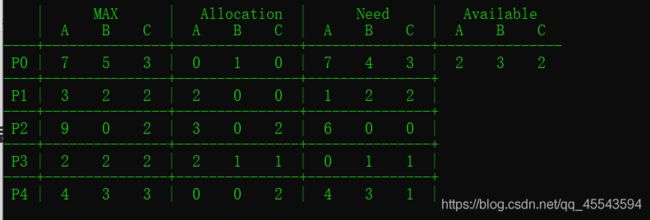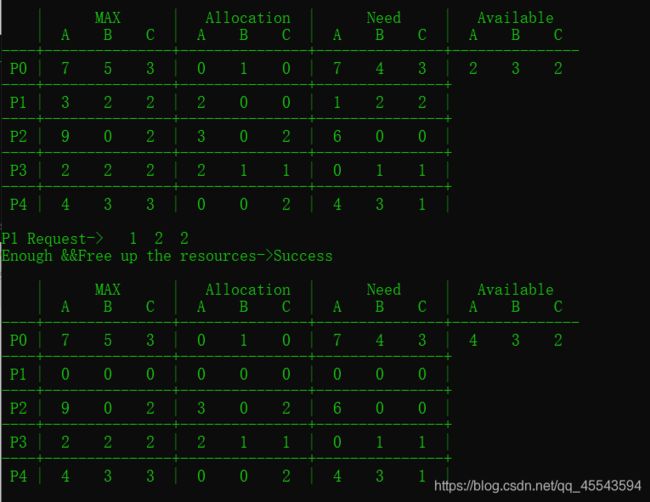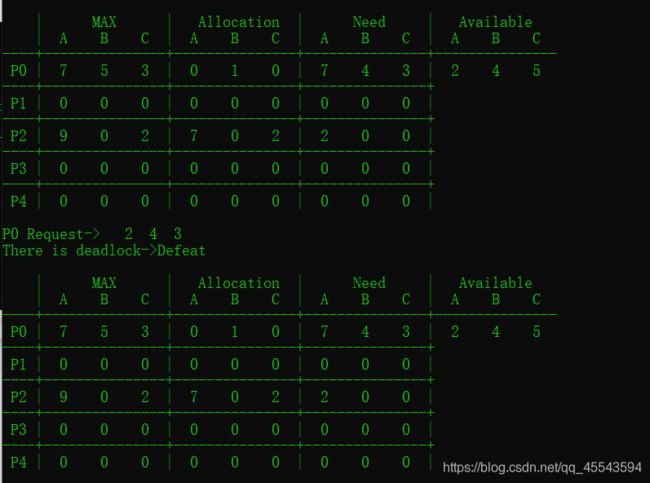安全性算法
- 题目背景
- 作答
-
- 思路解释
- 关键结构与函数
-
- struct Reource
- struct Situation
- void show(
- void ini(
- void request(
- int respond(
- void update(
- int NoEnd(
- main()
- 关键运行结果
-
- ① 初始化后
- ②P1 Request-> 1 2 2
- ③P0 Request-> 2 4 3
- ④运行到最后
- 分析与尝试
-
- ①分析
- ②尝试
- 附录:代码
题目背景
作答
思路解释
①每次随机选取一个进程,生成一个request
②对这个request,进行判断,看是否资源足够,看是否会死锁。
③如果资源足够了,释放资源。
④如果所有进程都结束了,退出循环,结束。
关键结构与函数
struct Reource
struct Reource {
//资源ABC...,n是资源的个数
int n = SIZE;
int num[SIZE];
};
struct Situation
struct Situation {
int n = N;
struct Reource Maxn;//需要的最大资源
struct Reource Allocation;//当前已经调用的资源
struct Reource Need;//还需要的资源
int flag=0;
void update() {
//Need=Maxn-Allocation
for (int j = 0; j < Need.n; j++) {
Need.num[j] = Maxn.num[j] - Allocation.num[j];
}
}
} ;
void show(
展示进程的资源,和可用资源
void ini(
int in[6][6] = {
{7, 5, 3, 0, 1, 0},
{3, 2, 2, 2, 0, 0},
{9, 0, 2, 3, 0, 2},
{2, 2, 2, 2, 1, 1},
{4, 3, 3, 0, 0, 2},
void request(
生成一个请求,对P[index]进行请求
int respond(
对请求request进行分析,并返回
-1:资源不够
0: 资源够,但会死锁
1: 资源够,但不足以完成当前进程
2: 资源够,且足以完成
void update(
调用request(),对respond()不同返回值进行不同操作
int NoEnd(
判断是否所有进程都结束了,结束返回0,没结束返回1;
main()
int main(int argc, char **argv) {
ini(P,Available);
show(P,Available);
while(NoEnd(P)) {
update(P,Available);
show(P,Available);
//sleep();
}
return 0;
}
关键运行结果
① 初始化后
②P1 Request-> 1 2 2
③P0 Request-> 2 4 3
④运行到最后
分析与尝试
①分析
对于请求Request,我采用的方法是
//伪代码
Request=min(P[index].Need,Available)
这样,资源可以逐渐增加,不会存在死锁
我想到的缺点是:这样对那些需要资源比较多的进程不太友好。
②尝试
为了解决①的缺点,我尝试了生成随机请求
这是一次失败的尝试,但是让我加深了理解,更加理解了资源的request 和respond
tt=min(P[index].Need+1,Available+1);
if(tt!=0)Request=rand()%tt
然后就死锁了。。。。。。。。。。。
操作和理由如下
我对于这个请求能不能够响应的判断操作是:如果request响应后,if有其他进程t可以接着响应,那么就不会死锁。
但是这并不正确,因为t释放的资源可能不足以响应所有进程。
打个比方:
| Max | Allocation | Need | |
|---|---|---|---|
| P0 | 7 | 0 | 7 |
| P1 | 6 | 0 | 6 |
| P2 | 2 | 1 | 1 |
| Available |
|---|
| 5 |
正确顺序:
P2->request(1),P1->request(6),P0->request(7)
按照随机生成:
P0->request(3),如果响应,剩下的资源还可以响应P2继续释放资源,看似现在不会死锁,其实响应P2后会死锁:
P0->request(3),后:
| Max | Allocation | Need | |
|---|---|---|---|
| P0 | 7 | 3 | 4 |
| P1 | 6 | 0 | 6 |
| P2 | 2 | 1 | 1 |
| Available |
|---|
| 2 |
之后资源只够响应进程P2->request(1)
| Max | Allocation | Need | |
|---|---|---|---|
| P0 | 7 | 3 | 4 |
| P1 | 6 | 0 | 6 |
| P2 | 0 | 0 | 0 |
| Available |
|---|
| 3 |
然后就死锁了。
可见,如果一个进程发出一小部分的资源请求,即使响应之后能有其他进程响应,释放的资源如果不够的话,也会存在死锁。
附录:代码
代码存放在两个文件:main.cpp、function.h
//main.cpp
#include //function.h
#define N 5
#define SIZE 3
#include



